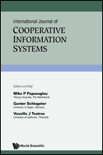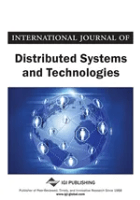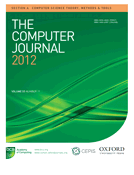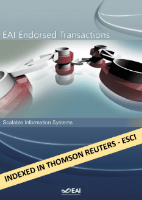
Frontiers in Big Data
Scope & Guideline
Advancing Knowledge at the Intersection of AI and Information Systems
Introduction
Aims and Scopes
- Big Data Analytics and Techniques:
The journal emphasizes the development and application of advanced analytics techniques, including machine learning, data mining, and statistical analysis, to extract meaningful insights from large datasets across various domains. - Interdisciplinary Applications:
Research published in the journal spans a wide range of fields such as healthcare, finance, urban planning, and environmental studies, showcasing how big data can be leveraged to address complex challenges in these areas. - Data Governance and Ethics:
The journal addresses critical issues surrounding data governance, privacy, and ethical implications of big data usage, reflecting the growing concern for responsible data practices in research and industry. - Innovative Technologies and Tools:
Focus is placed on the exploration of new technologies and frameworks that facilitate big data processing and analysis, including cloud computing, IoT, and blockchain solutions. - Community and Social Impact:
Papers often explore the societal implications of big data, including its role in enhancing community engagement, public health, and sustainable development.
Trending and Emerging
- Automated and Explainable AI:
There is a significant increase in research related to the automation of AI processes and the development of explainable AI frameworks, which are crucial for enhancing trust and transparency in AI applications. - Health Data Analytics:
The healthcare sector is seeing a surge in big data applications, particularly in predictive modeling, patient monitoring, and personalized medicine, highlighting the importance of data-driven decision-making in healthcare. - Privacy-Preserving Technologies:
Emerging research is focused on privacy-preserving techniques such as differential privacy and federated learning, which are essential in addressing growing concerns about data security and individual privacy. - Integration of Multi-Modal Data:
The trend towards integrating multi-modal data sources (e.g., text, images, sensor data) for comprehensive analysis is on the rise, as researchers seek to harness diverse data types for enhanced insights. - Sustainability and Environmental Impact:
Research exploring the role of big data in sustainability and environmental management is increasingly prevalent, reflecting a broader societal push towards addressing climate change and resource management challenges.
Declining or Waning
- Traditional Data Processing Techniques:
There has been a noticeable decline in papers focusing on traditional, non-automated data processing methodologies as researchers increasingly adopt more advanced, automated techniques such as machine learning and AI-driven approaches. - Single-Domain Studies:
Research that focuses exclusively on single-domain applications of big data is waning, with a growing trend toward interdisciplinary and multi-domain studies that leverage big data across various sectors. - Descriptive Statistics and Simple Analytics:
The use of basic descriptive statistics and simple analytical methods has decreased as the field moves toward more complex models and deep learning techniques that provide richer insights from data. - Static Data Analysis:
Papers that concentrate on static data analysis without considering dynamic, real-time data applications are becoming less frequent, reflecting the industry's shift towards real-time analytics and streaming data. - Generalized Data Privacy Discussions:
While data privacy remains crucial, general discussions on privacy without specific frameworks or innovative solutions are appearing less frequently, as the focus shifts towards more actionable and specific privacy methodologies.
Similar Journals

INTERNATIONAL JOURNAL OF COOPERATIVE INFORMATION SYSTEMS
Enhancing Efficiency through Collaborative ResearchINTERNATIONAL JOURNAL OF COOPERATIVE INFORMATION SYSTEMS
Published by WORLD SCIENTIFIC PUBL CO PTE LTD, the INTERNATIONAL JOURNAL OF COOPERATIVE INFORMATION SYSTEMS plays a pivotal role within the fields of Computer Science and Information Systems. With a focus on the development and application of cooperative information systems, this journal aims to foster innovation and collaborative research among scholars and professionals. Established in 1996, the journal has consistently published high-quality research that contributes to a better understanding of cooperative methodologies, enhancing system efficiencies across various applications. While its impact factor remains undisclosed, the journal is positioned in the Q4 category of the Scopus rankings, indicating a growing presence in the academic community. Although it does not offer open access, its rich repository of articles remains accessible to subscribers and relevant institutions. Located in Singapore, this journal will continue to serve as a critical resource for researchers, practitioners, and students keen on exploring the evolving dynamics of information systems in today's interconnected world.

Computer Science and Information Systems
Pioneering Research for a Digital TomorrowComputer Science and Information Systems, an esteemed journal published by the COMSIS CONSORTIUM, serves as a vital platform for researchers and practitioners within the field of computer science and information systems. With an ISSN of 1820-0214, this open access journal has been disseminating high-quality research since 2004, making scholarly content readily accessible to a global audience. Based in Novi Sad, Serbia, the journal has established itself as a point of reference in the academic community, achieving a Q3 ranking in the Computer Science (miscellaneous) category as of 2023. With its coverage spanning from 2008 to 2024, it caters to a diverse range of topics, including software engineering, data processing, and system architecture. Although the HIndex is currently not available, the journal holds a respectable 43rd percentile ranking in the Scopus database for general computer science, showcasing its relevance in the field. By offering an open access model, it ensures that groundbreaking research can be freely accessed and utilized, fostering innovation and collaboration across disciplines.

International Journal of Distributed Systems and Technologies
Driving Impactful Discoveries in Distributed Systems.Welcome to the International Journal of Distributed Systems and Technologies, a prominent academic platform published by IGI Global dedicated to advancing the field of distributed systems and technologies. With an ISSN of 1947-3532 and an E-ISSN of 1947-3540, this journal, established in 2010 and continuing through 2024, offers a unique venue for researchers, professionals, and students to disseminate their findings in the realms of computer networks, communications, hardware, and architecture. Despite its current placement in the Q4 quartile for both computer networks and communications and hardware and architecture categories in 2023, the journal is committed to fostering innovative solutions and interdisciplinary collaboration that can drive future advancements. Although not open access, contributions to this journal not only receive rigorous peer review but also have the potential to significantly impact the community, underscored by a focus on applicable research that addresses the emerging challenges in technology. As part of a rich repository, the journal invites you to explore its latest issues and join in shaping the future of distributed systems.

COMPUTING AND INFORMATICS
Transforming Ideas into Technological AdvancementsCOMPUTING AND INFORMATICS is a peer-reviewed academic journal published by the Slovak Academy of Sciences Institute of Informatics, focusing on various aspects of computer science and its applications. Established in 2000, this journal has garnered attention for its emphasis on computational theory, computer networks, software development, and hardware architecture, placing it in the competitive landscape of academic publishing with currently a Q3 ranking in the fields of Computational Theory and Mathematics, and Computer Networks and Communications, as well as Q4 ranking in Software and Hardware and Architecture categories. Readers can access its findings through Open Access, promoting wider dissemination of innovative research. With an ISSN of 1335-9150 and an E-ISSN of 1335-9150, the journal serves as a vital platform for showcasing cutting-edge research in the field, aiming to bridge theoretical foundations with practical applications. This journal not only contributes to the academic community but also supports the ongoing advancements in technology and informatics, making it an important resource for researchers, professionals, and students keen on staying at the forefront of the field.

Big Data and Cognitive Computing
Advancing Knowledge in Data-Driven Technologies.Big Data and Cognitive Computing is a premier open-access journal published by MDPI, dedicated to advancing research in the dynamic fields of artificial intelligence, computer science, information systems, and management information systems. Since its inception in 2017, the journal has established a significant presence, reflected in its impressive categorization within the Q2 quartiles for multiple disciplines in the 2023 rankings. Situated in Switzerland, the journal provides a vital platform for researchers, professionals, and students to publish groundbreaking work and access high-quality articles, enhancing the exploration of big data applications powered by cognitive computing. With an increasing global emphasis on data-driven decision-making, Big Data and Cognitive Computing offers unrestricted access to innovative research findings, addressing both theoretical and practical aspects. The journal's contributions are integral for those looking to stay at the forefront of technological advancements and their implications across various sectors.

DATA & KNOWLEDGE ENGINEERING
Elevating Understanding in Information SystemsData & Knowledge Engineering is a prestigious, peer-reviewed journal dedicated to the fields of data management, information systems, and knowledge engineering. Published by Elsevier in the Netherlands, this journal serves as a critical resource for researchers, professionals, and students alike, offering a platform for high-quality, original research and innovative approaches in the realm of data-driven technologies and methodologies. With a considerable impact factor and classified in the Q2 quartile for Information Systems and Management, it ranks 47th out of 148 journals in its category, placing it in the esteemed 68th percentile according to Scopus metrics. Data & Knowledge Engineering covers a wide array of topics including database systems, data mining, and knowledge representation, ensuring that it remains at the forefront of advancing understanding and application in these dynamic fields. Engage with compelling articles and significant findings published since its inception in 1985, as the journal continues to shape the future of data-centric research up to 2024 and beyond.

COMPUTER JOURNAL
Unlocking the Potential of Interdisciplinary ComputingCOMPUTER JOURNAL, published by Oxford University Press, is a distinguished platform for innovative research in the field of computer science, with a focus on general and miscellaneous aspects. The journal, established in 1967, continues to advance the boundaries of knowledge in computational technologies, algorithms, and interdisciplinary applications, contributing to its impressive ranking of Q2 in the 2023 Scopus category for Computer Science. With a robust ISSN of 0010-4620 and E-ISSN 1460-2067, it serves as a vital resource for researchers, professionals, and students seeking to stay at the forefront of technological advancements. Though not an open-access journal, it provides numerous access options via institutional subscriptions, making its high-impact articles widely available, especially as the journal bridges over five decades of research from 1967 to 2024. The COMPUTER JOURNAL is committed to fostering scholarly communication and ensuring that critical insights in the ever-evolving realm of computer science reach a diverse audience, thus solidifying its role as an essential resource in academia.

JOURNAL OF INFORMATION SCIENCE AND ENGINEERING
Transforming Ideas into Innovative Solutions.JOURNAL OF INFORMATION SCIENCE AND ENGINEERING, published by the Institute of Information Science in Taiwan, is a pivotal platform for the dissemination of innovative research in the multidisciplinary fields of information science and engineering. Established in 1993, the journal primarily focuses on areas such as library and information sciences, human-computer interaction, hardware and architecture, as well as computational theory and software development. Despite holding a current Q4 ranking in several categories, the journal demonstrates significant potential for growth, particularly in computation and software systems, as evidenced by its Scopus rankings and percentiles. Researchers, professionals, and students will find this journal to be an invaluable resource to stay abreast of evolving theories and technologies in information science. The journal is accessible through traditional subscription models, fostering a broad academic outreach. It serves to enhance knowledge-sharing and collaboration within this dynamic and ever-evolving field.

EAI Endorsed Transactions on Scalable Information Systems
Bridging Theory and Practice in Information ScienceEAI Endorsed Transactions on Scalable Information Systems is a distinguished open access journal published by the INST COMPUTER SCIENCES, SOCIAL INFORMATICS & TELECOMMUNICATIONS ENG-ICST, Belgium. Since its inception in 2014, the journal has become a vital platform for disseminating cutting-edge research in computer networks, information systems, and scalable communications technologies, striving to enhance our understanding and implementation of scalable approaches in information systems. With a commendable impact in the field, it has achieved a Q3 ranking for multiple categories such as Computer Networks and Communications, Computer Science Applications, and Software in 2023. The journal aims to foster innovation and collaboration among researchers, practitioners, and educators, facilitating the exchange of scholarly articles that address critical challenges and developments in the rapidly evolving landscape of information systems. By providing a free and accessible platform for high-quality research, the journal plays an essential role in elevating the discourse within the fields of computer science and information technology.

Future Generation Computer Systems-The International Journal of eScience
Pioneering Research for a Digital FutureFuture Generation Computer Systems - The International Journal of eScience, published by ELSEVIER, stands at the forefront of the fields of computer networks, hardware architecture, and software engineering, as evidenced by its impressive Q1 quartile rankings in 2023 across these categories. With an ISSN of 0167-739X and an E-ISSN of 1872-7115, this esteemed journal has been a significant contributor to the body of knowledge in the computer science domain since its inception in 1984, continuing to shape the landscape of eScience through cutting-edge research and innovative practices. Featuring a broad scope that embraces various interrelated disciplines, Future Generation Computer Systems is particularly recognized for its high impact factor and prestigious Scopus rankings, where it ranks in the top echelons—8th in Computer Networks and Communications, 5th in Hardware and Architecture, and 17th in Software—placing it in the 95th to 98th percentiles of their respective fields. Although currently not open access, the journal provides invaluable insights and advancements aimed at researchers, professionals, and students alike, driving the evolution of technology and its applications in an increasingly digital world.